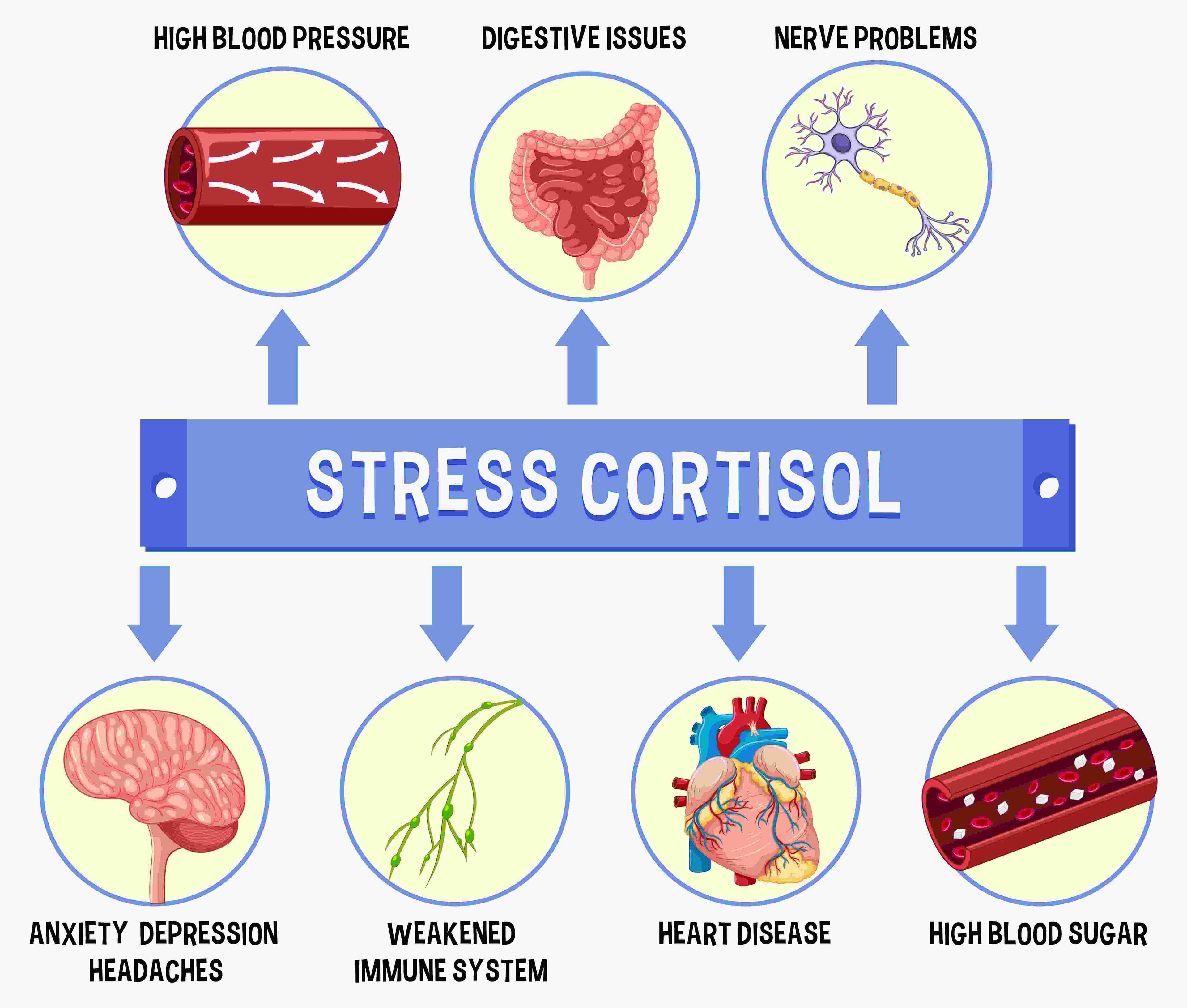What is Cortisol: The Stress Hormone

MyFitnessCoach
October 11, 2023
Cortisol, sometimes called the "stress hormone," serves an important function within our bodies, impacting several facets of our health and overall wellness. Although it might seem like a complex concept, understanding the basics of cortisol is fundamental for individuals looking to sustain a healthy way of life and effectively deal with stress. Within the following sections, we will delve into the essence of cortisol, explain its significance, explore its effect on our well-being, and provide insights into how we can maintain its balance.
The Role of Cortisol
Cortisol has several important functions in the body, and it plays a role in maintaining overall health and well-being. Here are some key functions of cortisol:
- Stress Response: Cortisol is often associated with the body's "fight or flight" response to stress. When you perceive a threat, your adrenal glands release cortisol to provide the energy and alertness needed to deal with the situation. This can be helpful in emergencies but can be problematic when stress is chronic.
- Regulating Metabolism: Cortisol helps regulate glucose metabolism by increasing blood sugar levels. This provides additional energy when needed, especially during stressful situations. However, chronically elevated cortisol levels can lead to imbalances in blood sugar and weight gain.
- Immune System Suppression: Cortisol has immunosuppressive properties, meaning it can reduce the activity of the immune system. This is useful in short bursts to reduce inflammation during a stress response. But prolonged stress can weaken the immune system, making you more prone to illness.
- Influence on Mood and Emotions: Cortisol can impact your mood and emotions. High cortisol levels are associated with increased anxiety, bad temper, and even depression. It can also affect memory and cognitive function.
- Regulating Sleep-Wake Cycle: Cortisol follows a diurnal (daily) rhythm, with levels peaking in the morning to help you wake up and stay alert throughout the day. In the evening, cortisol levels drop to promote relaxation and prepare the body for sleep.
The Cortisol-Stress Connection
Now that we know what cortisol is and its functions let's dive deeper into how it's related to stress. Stress is a natural response to challenging situations, and cortisol helps us deal with it by providing the necessary energy and focus. Here's how the cortisol-stress connection works:
- Perception of Stress: When your brain perceives a stressful event, it signals the adrenal glands to release cortisol into the bloodstream.
- Energy Boost: Cortisol increases blood sugar levels by breaking down stored glucose, providing your muscles and brain with a quick energy boost. This helps you respond to the stressor effectively.
- Reducing Inflammation: Cortisol also decreases inflammation in the body, which can be beneficial during acute stress. It prevents the immune system from overreacting to minor injuries or infections.
- Suppression of Non-Essential Functions: During times of stress, cortisol temporarily suppresses non-essential functions, such as digestion and reproduction, to prioritize energy for dealing with the immediate threat.
Balancing Cortisol Levels
While cortisol is vital for our survival, prolonged or chronic elevation of cortisol levels can have adverse effects on our health. High-stress levels and persistent cortisol release can lead to problems such as anxiety, depression, weight gain, and immune system dysfunction. Therefore, it's essential to maintain a healthy balance of cortisol in our bodies. Here are some simple ways to do that:
- Stress Management: Learning how to manage stress effectively is crucial for keeping cortisol levels in check. Techniques such as deep breathing, meditation, yoga, and exercise can help reduce stress and lower cortisol levels.
- Adequate Sleep: Ensure you get enough sleep; as disrupted sleep patterns can lead to elevated cortisol levels. Aim for 7-9 hours of quality sleep per night to support your body's natural cortisol rhythm.
- Healthy Diet: Eating a balanced diet with plenty of fruits, vegetables, lean proteins, and whole grains can help stabilize blood sugar levels, preventing excessive cortisol release.
- Regular Exercise: Engaging in fitness workouts can help manage stress and regulate cortisol levels. Aim for at least 30 minutes of moderate exercise most days of the week.
- Limit Caffeine and Alcohol: Excessive caffeine and alcohol consumption can disrupt cortisol levels. Limit your intake of these substances, especially in the hours leading up to bedtime.
- Connect with Others: Social support is essential for managing stress. Spending time with loved ones and talking about your feelings can help reduce stress and its impact on cortisol.
- Mindfulness and Relaxation Techniques: Practicing mindfulness, progressive muscle relaxation, or guided images can help you relax and reduce cortisol levels.
Simply put, cortisol is a hormone your body produces in response to stress. While it serves essential functions, chronic stress, and elevated cortisol levels can lead to various health problems. Therefore, it's crucial to manage stress through lifestyle choices like regular exercise, a balanced diet, and relaxation techniques. By maintaining a healthy cortisol balance, you can promote overall well-being and improve your resilience in the face of life's challenges. Understanding cortisol is the first step toward a happier, healthier life.

Fitness is not just about doing some workouts and eating healthy, it’s the complete science and a whole lifestyle. Download MyFitnessCoach app right now and delve into the fitness world.
Frequently Asked Questions
Similar Articles
Stay informed with these similar articles.

MyFitnessCoach
October 18, 2023
What Does Body Goals Mean? A Path to a Healthy Lifestyle
In the world we live in now, lots of people talk about "body goals," which means having a body that's seen as perfect. On social media, in magazines, and on TV, we see lots of pictures of people with what seems like perfect bodies, which makes us feel like we have to look like them. But the real meaning of "body goals" is more than just looking good. It's about taking care of your whole self, not just how you look. In this article, we will discuss what does body goals actually mean and how you can achieve your body goals. Let’s get started:
.webp&w=3840&q=75)
MyFitnessCoach
September 5, 2023
How Much Protein in an Egg | The Nutritional Power
Eggs have long been a breakfast favorite for many, and for good reason. They're not only delicious but also packed with essential nutrients, making them a versatile and nutritious addition to your diet. One of the most common questions about eggs is, "How much protein is in an egg?" In this comprehensive guide, we'll delve into the world of eggs and explore their protein content, nutritional benefits, and how they can contribute to a balanced diet.

MyFitnessCoach
May 18, 2023
Fitness Guide: How Do I Start A Weight Loss Journey
Ready to start on a life-changing weight-loss journey? Congratulations for taking the first step towards being a better and happier version of yourself! Starting off a weight-loss journey may be both satisfying and stressful. With so much information available, having a well-defined plan and trusted assistance in achieving your goals is important. This article will help you start your weight-loss journey and achieve the results you desire.
